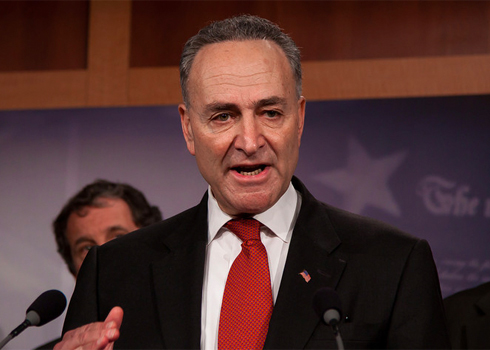Sen. Chuck Schumer (D-NY) called the Republican Party’s bluff on the need for deficit reduction Wednesday, outlining a fiscal framework that involves broader cuts and revenue raisers than the GOP has proposed — and warning that there will be no agreement on funding the government unless the GOP broadens its approach.
“A bipartisan compromise simply will not be found in the domestic discretionary spending cuts alone,” Schumer said in a half-hour presentation at the Center for American Progress. Without a broader scope, Schumer said, “we won’t be able to come to a compromise on a seven month budget.”
Schumer’s entreaty changes the frame of the debate on Capitol Hill, which for weeks has been driven by Republican leaders, who have isolated their focus to domestic discretionary spending. Democratic leaders, who are unwilling to countenance major cuts to government services, had little luck playing on GOP turf, but will now have a coherent alternative to point to when negotiations over how to fund the government continue in coming days.
Schumer noted that the GOP’s plan for spending cuts does almost nothing to reduce the deficit — a fact that runs at cross-purposes to their insistence that the deficit must be reduced.
“Right now a very small, very intense ideological tail is wagging the dog over in the House of Representatives,” Schumer said. “Their fervor for spending cuts is not grounded in deficit reduction at all. Instead the far right wing has deliberately confused two separate issues. They’ve conflated reducing the deficit — which is not their true priority — with cutting government — which is.”
Schumer endorsed the approaches taken by Presidents George H.W. Bush and Bill Clinton, both of whom reduced or eliminated deficits by cutting discretionary spending and addressing entitlements and tax revenues. He identified achievable savings on all three flanks, including cuts to defense spending, agriculture subsidies, and a surtax on millionaires and billionaires.
“I noted with interest last week’s Wall Street Journal/NBC poll, the most popular proposal to reduce the deficit out of 23 options surveyed was a tax — a surtax — on millionaires and billionaires,” Schumer said. “It’s not only a popular thing to do, it’s the right thing to do.”
Schumer left Social Security off the table, noting that it doesn’t run into real actuarial problems for decades, and isn’t a contributor to the deficit.
Republicans were caught off guard by the Democrats’ new approach.
“Right now we need to crawl before we can walk, and that means finishing last year’s business and complete a spending bill,” said Michael Steel, spokesman for House Speaker John Boehner.
Don Stewart, spokesman for Senate Minority Leader Mitch McConnell, also tried to retrain the focus on the narrow sliver of the budget where Republicans feel most comfortable. “Their answer is to raise taxes, not to cut spending, and that’s not something anyone else is talking about,” he said.
Schumer’s presentation shifts the onus in budget negotiations on to Republicans to explain why their focus is so limited. But fundamentally, the dynamics of that debate haven’t changed. One side will have to blink, or something will give — the government will shutdown, or be hampered by a series of short-term stop-gap spending bills until the next budget cycle begins, and round and round we go.










